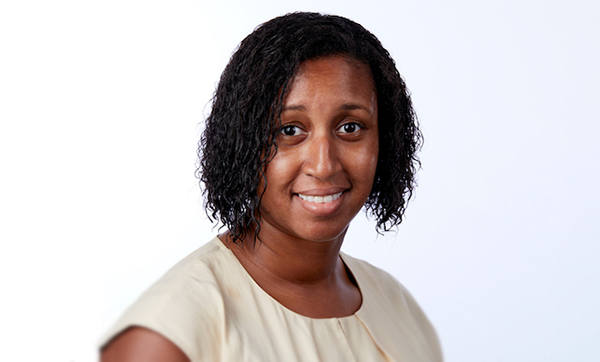Professor Shares Love for Biostatistics with Students from High School to Grad School.

Professor Shares Love for Biostatistics with Students from High School to Grad School
Jacqueline Hicks, clinical associate professor of biostatistics, enjoys helping students overcome their “math and statistics phobias” in her Quantitative Methods core course.
As Jacqueline Hicks (SPH’14) was finishing her PhD at SPH, the Department of Biostatistics was looking for a clinical faculty member—a professor whose primary focus would be student instruction, rather than research. Hicks, who had discovered a passion for teaching as a master’s student, was perfect for the job. Eight years later, she is a cornerstone of the SPH instructional faculty as a clinical associate professor.
“What has made me stay,” she says, “is that—compared to other universities’ schools of public health—BU places a heavy emphasis on good teaching.”
Hicks especially enjoys teaching introductory courses such as Quantitative Methods for Public Health, a core course in the MPH program. “It’s one of the most feared courses among the MPH students—particularly those who have math or stat phobia,” she says. Hicks enjoys taking those nervous students by the hand and showing them that they are more capable than they realize. “I help them get over that phobia and help them understand they can use this knowledge in an everyday setting, not just in public health.”
MPH student Bala Pillalamarri took Hicks’ Quantitative Methods course at the beginning of the program. “Dr. Hicks worked patiently with the students to condense the concepts to a fundamental level and she was always available for all our questions,” she says. When Pillalamarri later became a teaching assistant for the course, she says she found herself emulating many of Hicks’ teaching techniques.
Hicks works primarily with graduate students, but each summer she puts her teaching talents to work introducing younger students to biostatistics.
She teaches and mentors undergraduate students as co-director of BU’s federally funded Summer Institute for Biostatistics (SIBS). The program brings college students with an interest in math, statistics, health, and biology to campus for six weeks to introduce them to the field of biostatistics, with the goal of recruiting more people to the profession. It’s a successful program, with more than 60 percent of participants eventually earning graduate degrees in biostatistics or related fields.
Interacting with SIBS students during the six-week residency is fulfilling, “but what I really enjoy is what comes after,” Hicks says. She often keeps in touch with SIBS participants, helping them with graduate school applications and sharing in their academic and professional successes. “So many of them have earned master’s degrees and PhDs and are leaders in the field in different academic institutions and in pharmaceuticals. It’s great to see what they’ve done.”
Hicks’s summers also include running a biostatistics lab for high schoolers enrolled in Upward Bound, a program designed to support low-income and first-generation college-bound students, many of whom come from minority communities. Hicks got involved with Upward Bound after helping many minority undergraduates prepare for graduate school. ‘
“There’s a lot of funding to get these students into grad school, but at that point, the inequities are already there, and they’re really difficult to overcome,” Hicks says. She hopes that providing extra support to minority students while they are still in high school will help many more of them succeed in college and beyond.
Comments & Discussion
Boston University moderates comments to facilitate an informed, substantive, civil conversation. Abusive, profane, self-promotional, misleading, incoherent or off-topic comments will be rejected. Moderators are staffed during regular business hours (EST) and can only accept comments written in English. Statistics or facts must include a citation or a link to the citation.